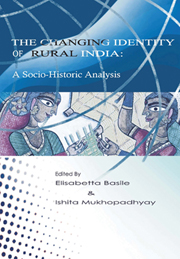Book contents
- Frontmatter
- Contents
- Acronyms and Abbreviations
- About the Authors
- INTRODUCTION
- PART 1 INDIAN RURAL TRANSFORMATIONS
- PART 2 INEQUALITY IN RURAL INDIA
- Social Capital and Poverty Reduction Strategies: The Case of Rural India
- An Overview of Indian Microfinance
- Income-based Estimates vs Consumption-based Estimates of Poverty: Evidence from Rural Tamil Nadu after Liberalization
- Occupational Diversification of the Rural Workers: Some Results from Field Surveys in West Bengal
- Literacy and Externalities in Human Development
- PART 3 SOCIAL MOVEMENTS AND IDENTITIES
- Appendix 1 Socio-Economic Indicators of Rural India
Occupational Diversification of the Rural Workers: Some Results from Field Surveys in West Bengal
from PART 2 - INEQUALITY IN RURAL INDIA
Published online by Cambridge University Press: 05 March 2012
- Frontmatter
- Contents
- Acronyms and Abbreviations
- About the Authors
- INTRODUCTION
- PART 1 INDIAN RURAL TRANSFORMATIONS
- PART 2 INEQUALITY IN RURAL INDIA
- Social Capital and Poverty Reduction Strategies: The Case of Rural India
- An Overview of Indian Microfinance
- Income-based Estimates vs Consumption-based Estimates of Poverty: Evidence from Rural Tamil Nadu after Liberalization
- Occupational Diversification of the Rural Workers: Some Results from Field Surveys in West Bengal
- Literacy and Externalities in Human Development
- PART 3 SOCIAL MOVEMENTS AND IDENTITIES
- Appendix 1 Socio-Economic Indicators of Rural India
Summary
In recent years, a great deal of discussion has taken place on the issue of occupational diversification by the rural households, particularly in the developing countries. It has been observed that most of the households in rural areas of the developing countries depend on a diverse portfolio of activities and income sources, alongside crop and livestock production (Ferrington et al., 2006). This has been a part of their survival strategy as also their aim to reduce the risk of income failure (Ellis, 1998, 2000; Barrett et al., 2001; Reardon et al., 2001; Lanjouw and Lanjouw, 2001). Another beneficial effect of diversification is that it helps to mitigate ‘labour smoothening’ problems which arise due to seasonality of pure agricultural operations.
However, it is to be admitted that the diversification strategy of the household may not necessarily coincide with the individual worker-level diversity. As argued by Ellis (2000), although the household may have diverse activity portfolio, which might have been maintained for security and/or good returns, individual household members might specialize in single occupations/sectors depending upon their own choice that is often determined by a host of factors. In that event, it becomes imperative to explore those factors, which govern choice of occupations among possible alternatives by the individual workers in rural areas.
Our main purpose in this paper is to examine the patterns and determinants of occupational diversification by the rural workers in West Bengal.
- Type
- Chapter
- Information
- The Changing Identity of Rural IndiaA Sociohistoric Analysis, pp. 150 - 173Publisher: Anthem PressPrint publication year: 2009

